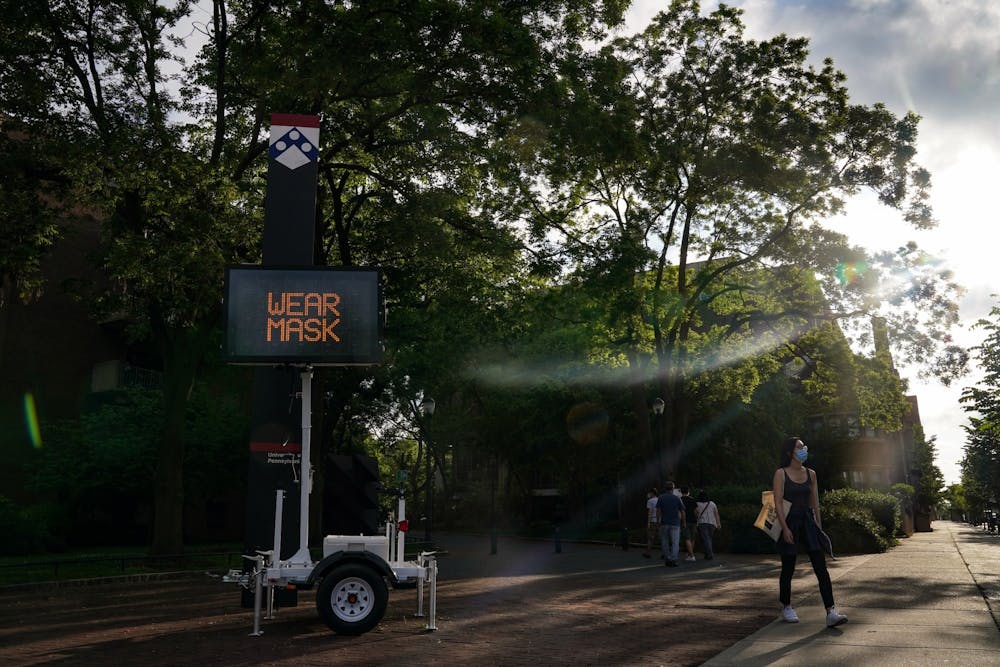
Penn is reporting 176 confirmed or probable coronavirus cases which comprise of undergraduate, graduate, and professional students currently in the country and abroad.
Credit: Chase SuttonAs states all around the United States reach new COVID-19 case highs and as many continue to ignore signs of new outbreaks, Penn’s decision to bring all students back to campus is both exciting and concerning. While students and professors may prefer an in-person experience, the rising concerns about COVID-19’s spread must be addressed. In Penn’s email to the student body, they outlined their plan to ensure students follow all social distancing and protective guidelines to limit the spread of COVID-19 on campus. Referred to as the “Student Campus Compact,” Penn’s health experts call it a “series of expectations for student behavior.”
Based on the idea that we are all responsible enough to look out for each other, the Student Campus Compact places the onus on us to make the safest choices. We need to realize the implications of this decision and be prepared to make hard choices. That means truly social distancing; that means actually wearing a mask in public; that means staying away from large parties; and that means realizing that the Penn experience we all knew before is no longer a possibility, at least for the time being. We must adjust our expectations accordingly or risk endangering the health of others.
Penn's Chief Wellness Officer Benoit Dubé said Penn's ability to monitor if students are following the Compact will generally be on the honor system without strict University oversight. On one hand, this is a positive. The University trusts us to be responsible. As college students, we should be responsible enough to realize that our actions during this pandemic can put ourselves and others at immediate risk. On the other hand, it makes it much easier to distance ourselves from the problem and the consequences. To that end, just as the news is rife with reports of increasing COVID-19 cases, we also continue to see people, many of them our age, not taking the pandemic seriously.
At the core of this pandemic is the question of utilitarianism. In March, the concept of quarantine was still novel. The panic was real and for many, quarantine seemed like a reasonable albeit inconvenient way to slow down the spread of the virus. Upholding classic utilitarian values of doing what benefits the largest group of people was not yet taxing.
However, as virus cases seemed to trickle downward and March turned into May, our restlessness increased. Whether stressed financially or simply missing the freedom of hanging out with friends, the pressures of a continuous quarantine started to outweigh the goal of flattening the curve. Now, as we move into July, we are suffering from decreased concern in spite of an increased risk of contracting the virus. Parties, large dinners with friends, and vacations are slowly trickling back onto everyone’s Snapchat stories and Instagram feeds, the utilitarian benefit to quarantine long forgotten.
Irrespective of your own personal concerns about the virus, Penn’s compact argues for an understanding of the effect of your actions on others. Studies show that while younger people may be less at risk to contract the virus, they are “disproportionately responsible for asymptomatic transmission.” Whether or not we feel sick, our actions to not social distance or forgo wearing a mask put professors, essential workers, and our Philadelphian neighbors at risk.
If the wellbeing of others is not reason enough to strictly adhere to social distancing guidelines, data shows that 40% of hospitalizations for COVID-19 at the end of June were for people 18–49 years old, a significant increase from the 26% at the end of March. The pandemic is real and our concern needs to match that.
Penn’s Compact asks us to accept a new normal. To those who have relied on a perception of untouchability or who have halfheartedly accepted social distancing guidelines, a return to Penn requires you to acknowledge a change must occur. We cannot make the mistake of believing all is back to normal simply because we are coming back.
Penn has staked the health of many on adherence to an honor code. Now more than ever, we must demonstrate our Quaker roots–our care for others–and follow Penn’s Compact. This means following guidelines that place a limit on partying, hanging out with friends, trips into the city, group activities, club events and brunches, and late-night rendezvous. This means continuing to delay gratification in the name of keeping others safe.
So yes, it is okay to get excited about being back on campus and about seeing friends from a distance. But please, make the right choices and keep Penn healthy.

AGATHA ADVINCULA is a rising College junior from Brooklyn, N.Y. studying Health and Societies.
Have opinions of your own you would like to share? Submit a guest column.
The Daily Pennsylvanian is an independent, student-run newspaper. Please consider making a donation to support the coverage that shapes the University. Your generosity ensures a future of strong journalism at Penn.
Donate







